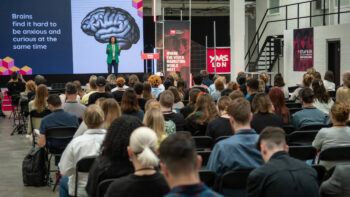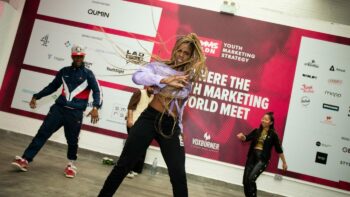
Difficult Conversations: Approaching Taboos With Gen Z
Gen Z is a generation of open, forward-thinking, eager-to-learn individuals, meaning that topics which may have been considered taboo in the past are now back on the table and ready to be discussed. Gen Z is normalising traditionally difficult topics and is unafraid to ask you and your brand the difficult questions. But are there some taboos still around, some questions still make them feel uneasy?
Voxburner’s YMS21 LDN event welcomed Harri Lowndes (CoppaFeel!), Gabby Edlin (Bloody Good Period), Earl Myers (Cleo) and Dipika Saggi (Campaign Against Living Miserably (CALM)) joined the panel ‘The Last Taboos for Young People’, where they discussed the difficult topics out there, how their brands are approaching those difficult conversations and what steps you can take to build trust with younger consumers.
What are the biggest challenges for normalising difficult topics?
According to our panellists, the sheer amount of taboos and conversations out there can sometimes make it difficult to know where to start. It’s all about focusing in on what’s important to you and your brand and making it as accessible and engaging as possible for your audience.
- “There’s such a large volume of topics that Gen Z are talking about that it can be quite overwhelming, and one of the biggest challenges and/or opportunities is making it more digestible, making it part of an everyday conversation, and making it accessible. Without it being accessible we can’t actually make real change.” Dipika
- “I think it’s [about] creating content that’s going to be fun and engaging and interesting but also placed in an environment where your audience is, and I think when you want to start that conversation you need to get the content to be relatable and accessible and digestible to them.” Harri
Is Gen Z more willing to talk than previous generations?
Put quite simply: yes. Bloody Good Period have found that Gen Z are more willing and open than any generation before them, so you know that your audience is ready and poised to learn. In fact, one of the top ways that Gen Z describes themselves is ‘forward-thinking’ (US Youth Trends Report 2021).
- “Our interaction [amongst our older audience] is always ‘Oh, I never thought I could say this’ etc, whereas our younger audience is just commenting ‘Have you tried a menstrual cup? I have, I love it’. They’re not coming at it from a place of taboo, they’re coming at it as a ‘This is my right to talk about my body.” Gabby
How can your brand support young people who are going through a difficult time? Or even just through this important, growing period of their lives?
The general consensus from our panellists was that brands need to build a relationship with Gen Z, because this familiarity breeds trust. This will then help you to help them reach their goals – as previously mentioned, there’s so much information out there that sometimes they just need to know what questions to ask in the first place. You also need to believe in your brand and your values/goals – if you don’t, who else will?!
- “Make it less scary… give them an entry point. This generation loves to do their own research – they have more access to information, but they just don’t know where to start.” Earl
- “Fear can be paralysing; being cheeky, funny and bold breaks down those barriers and makes conversations easier to have.” Harri
The power of influencers and young people
Using influencers in marketing campaigns is nothing new, but are you using the right people? By tapping into the influencers and content creators that your audience are already engaging and interacting with automatically makes your message that bit more relatable. In regards to the pandemic, 51% of Gen Z believe that celebrities and infleuncers have a responsibility to set a good example (UK Youth Trends Report 2021), suggesting that young people are willing and ready to follow in the footsteps of responsible influencers.
- “Working with brands that are influential to the audiences that you’re trying to reach is a fantastic way of spreading your message. Working with them and finding creative ways to get your message out makes a huge difference to the number of people that you can reach.” Harri
- “Having someone that you aspire to, who’s inspirational or relatable, makes that conversation that little bit more approachable.” Dipika
- “Gen Z’s not something to be afraid of. The way for us to authentically communicate is just to hire and talk to the people that we’re trying to reach.” Earl
Your brand needs to be a reliable, trustworthy source of information
It’s no good just sharing a post that’s appeared on your feed, vaguely aligns with your brand values and looks aesthetically pleasing on your feed, brands have a responsibility to be reliable, and Gen Z know this – 42% of Gen Z believe that celebrities and influencers have a responsibility to fact check the information they’re sharing (UK Youth Trends Report, 2021), and this unquestioningly applies to brands, too. Make sure you do your research, both in order to keep your audience well and informed and safe, and as a way of building a trust two-way relationship.
- “For us, it’s always been really important to work with medical professionals to make sure that everything we say is factually accurate. I think that’s a real responsibility of charities and brands because it can feel really easy to just repost something, but actually you’re not unpicking the ways that it could be incredibly harmful to someone.” Gabby
But how do you start those conversations?
Gen Z’ers are at the point in their lives where they’re curious and want to learn. With an already captive audience who are engaged with the world and their futures, you just need to make sure that you’re starting those conversations in the right way.
- “It’s about sparking those thoughts when you’re at that point of curiosity. We hope it’s memorable enough to get their curiosity growing.’ Harri
- “It’s about being human, it’s about being current, it’s about being relatable. It’s about having those conversations in places that people naturally exist. So if we can have the conversion at a football pitch, if we can have it at a festival, then that’s where we really need to be.” Dipika
Want more like this? Subscribe to Voxburner+ for the latest stats, insights and events, as well as being able to watch all of our previous sessions and panels on demand. And don’t miss out on the latest from YMS21 LDN – sessions, including this session, which will uploaded for Voxburner+ subscribers soon…👀



